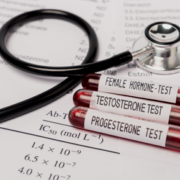Is Bioidentical Hormone Therapy the New Fountain of Youth?
Natural Hormone Therapy: BHRT is the Key to Anti-Aging
We all wish we had the secret to turning back the clock and looking and feeling like our younger selves! So, what if we told you that a safe and natural treatment available in the Southfield, MI, MI area does offer many antiaging benefits?
Understanding the causes of aging is the first step to reversing it. As we age, our hormone levels decline – which is the underlying leading cause of the physical and mental changes that are often associated with getting older. Weight gain, low energy, sexual problems, weak bones, brain fog, loss of muscle, sleep problems, and more can all have their cause rooted in the hormone decline of menopause in women and andropause in men.
But many people don’t realize that it is possible to slow down or even reverse the aging process by addressing hormonal imbalances. Natural hormone therapy can help restore balance, improve overall health, and enhance the quality of life for both men and women.
At Prosperity Health in the Southfield, MI area, Dr. Nishath Hakim offers safe, natural hormone therapy as a powerful tool to combat many of the physical, mental, and even cosmetic signs of aging.
Hormones Decline & How It Affects Aging
As we age, our bodies undergo significant hormonal changes. In women, menopause marks a dramatic decrease in estrogen and progesterone levels, leading to symptoms such as hot flashes, night sweats, mood swings, weight gain, painful sex, urinary incontinence, and more.
Men experience a similar phenomenon known as andropause, characterized by a gradual decline in testosterone levels. This decrease in testosterone – often called “Low T” – can lead to weight gain, muscle loss, fatigue, decreased libido, erectile dysfunction, and more. Addressing these imbalances through anti-aging hormone therapy can alleviate many of these symptoms and promote a more youthful and vibrant state of health at every age and stage of life.
Why BHRT is Safe & Natural
Bioidentical Hormone Replacement Therapy (BHRT) utilizes plant-derived hormones that are chemically identical to those naturally produced by the human body. Unlike synthetic hormones, bioidentical hormones are derived from natural sources and are tailored to match each individual’s specific hormonal needs.
This approach ensures better compatibility with the body’s natural processes, reducing the risk of side effects and improving efficacy. BHRT is considered safe and effective for managing symptoms of hormonal decline and is a cornerstone of anti-aging medicine.
Ways Hormone Therapy Can Slow or Reverse Aging:
Hormone Therapy for Weight Gain
During menopause or andropause, individuals often experience unexplained weight gain despite maintaining a healthy diet and exercise routine. In women, low estrogen levels can lead to fat accumulation around the midsection, known as visceral fat, which is associated with an increased risk of type 2 diabetes, heart disease, and other health issues.
In men, a decline in testosterone levels can result in an imbalance of female hormones, leading to fat storage in the belly and breast areas. Hormone therapy at Prosperity Health in the Southfield, MI area can help restore estrogen and testosterone levels, aiding in weight control – as well as preserving muscle mass.
Hormone Therapy for Building Muscle
Testosterone is vital for muscle growth in men, but estrogen also plays a significant role in muscle health for women. Research from the University of Minnesota has shown that estrogen is crucial for the function of satellite cells, which are responsible for muscle regeneration.
By maintaining hormonal balance, hormone therapy at Prosperity Health in the Southfield, MI area can support muscle building and maintenance, helping men and women stay strong and fit even as they get older.
Hormone Therapy for Wrinkles
Hormone decline also takes its toll on the skin – and wrinkles and lines are often viewed as inevitable aspects of aging. However, maintaining optimal hormone balance can protect the skin and delay these signs of aging.
Female hormones like estrogen play a crucial role in the production of collagen, elastin, and hyaluronic acid, which keep the skin plump, smooth, and hydrated. But hormonal decline can cause the skin to thin, lose elasticity, and dry out, leading to sagging, lines, and wrinkles. Hormone therapy at Prosperity Health in the Southfield, MI area can stimulate the production of these essential proteins, resulting in smoother, more youthful skin.
Hormone Therapy for Concentration & Memory
Low levels of estrogen and progesterone have been clinically proven to affect cognitive functions, leading to brain fog and memory issues. Restoring these hormones through therapy can improve mental clarity and enhance memory, supporting overall brain health.
Hormone Therapy for Lack of Energy
Fatigue is a common symptom of hormonal decline in both women and men. In women, a progesterone imbalance can cause sleepiness, while men with low testosterone often experience a significant decrease in energy levels. Additionally, thyroid hormone deficiencies, which are common in aging individuals, can slow metabolism and deplete energy levels.
Safe and natural hormone therapy at Prosperity Health in the Southfield, MI area can help restore balance, ensuring that both men and women maintain their vitality and energy at every age and every stage of their life.
Hormone Therapy for Women’s Hair Loss
Hair loss has a variety of causers. But in women, hair loss can be due to menopausal hormone decline. Menopausal hair loss tends to occur gradually, resulting in overall thinning rather than distinct bald patches. This diffuse thinning can affect the entire scalp, including the front, sides, and top. Hormonal imbalance can also cause hair to come out in clumps during brushing or washing.
By balancing women’s hormones with BHRT at Prosperity Health in the Southfield, MI area, hormone therapy can help reduce hair loss and promote healthier hair growth, offering a fuller, more vibrant head of hair.
Hormone Therapy May Reduce Alzheimer’s Risk in Women
Recent research has established a link between hormone decline and an increased risk of Alzheimer’s disease in women. Studies have shown that hormone replacement therapy can slow biological aging, particularly in women with a genetic predisposition to Alzheimer’s.
By maintaining hormone levels, BHRT may help decelerate the aging process and reduce the risk of developing Alzheimer’s disease in some women, providing a significant benefit for cognitive health.
Hormone Therapy for a Better Sex Life
In men, testosterone decline due to aging (“Low T”) often brings challenges such as erectile dysfunction (ED) and a decrease in sex drive. Hormone therapy can address these issues by restoring testosterone, improving sexual function and performance and reigniting desire.
For women, hormone therapy at Prosperity Health in the Southfield, MI area can often help alleviate sexual issues, including vaginal dryness, pain during intercourse, loss of sensation, and low libido, enhancing sexual satisfaction and intimacy.
Natural Hormone Therapy (BHRT) | Southfield, MI Area
At Prosperity Health in the Southfield, MI area we offer safe and natural BHRT hormone therapy as part of a comprehensive approach to anti-aging. Hormone therapy is in many ways a medical “fountain of youth” that can help manage or reverse many of the signs of aging, addressing everything from weight gain and wrinkles to energy levels and sexual health.
Dr. Nishath Hakim at Prosperity Health in the Southfield, MI area provides personalized hormone therapy tailored to each patient’s unique needs, ensuring you only receive the hormones you need to achieve the best possible results and reverse the signs of aging. By restoring hormonal balance, Dr. Hakim in the Southfield, MI area helps patients experience a significant improvement in their overall health and well-being, with restored youthful vitality.
If you live in the greater Southfield, MI area and you would like to learn how safe and natural hormone therapy can help you turn back time, schedule a consultation with Dr. Hakim at Prosperity Health today.






